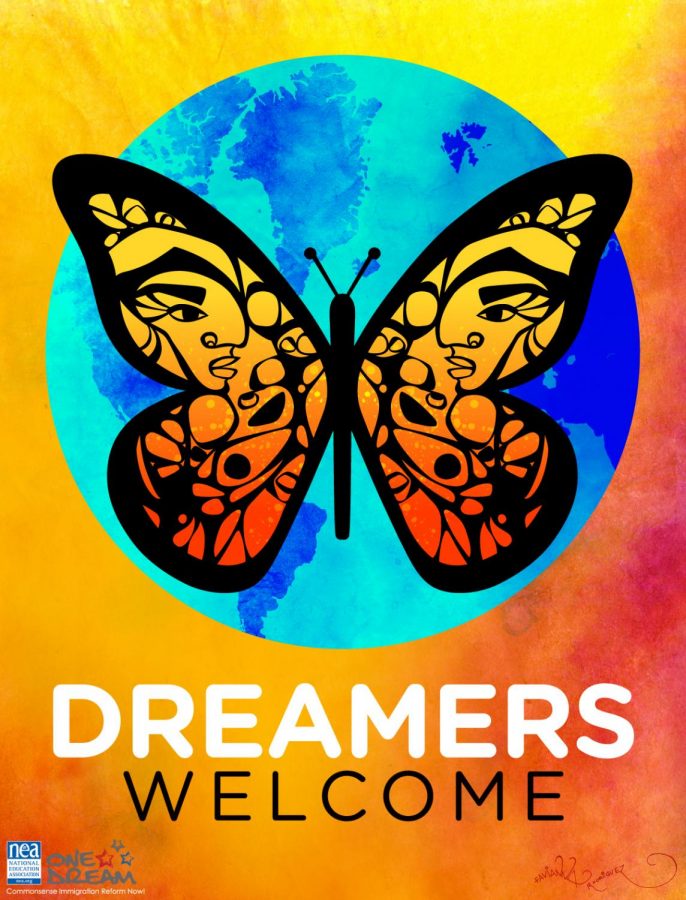Dreamer training held at UWO
A placard was given to Dreamer Certificate Training participants.
October 16, 2019
Last week the UW Oshkosh Student Organization of Latinos hosted a certificate training to introduce attendees to the unique issues immigrant students face in higher education and discuss ways UWO can support its documented or “DACAmented” and undocumented students.
Undocumented refers to those born outside of the United States who reside in the U.S. without legal permission of the federal government while DACAmented students refer to recipients of the Deferred Action for Childhood Arrivals program, or DACA, which protects eligible undocumented people from deportation and grants them work authorization for two years. Those protected under DACA are often referred to as “Dreamers.”
The Dreamer certificate training was led by Marla Delgado-Guerrero, a counseling psychologist and diversity coordinator at Marquette University, who has over 14 years of experience serving underrepresented college student populations and helped to establish and lead Marquette’s Undocumented Students Task Force.
“For those who work in higher education institutions like UW Oshkosh as faculty, staff and administrators, it is our responsibility to support and educate any student on our campus, and this includes our Dreamers,” Guerrero said. “So really, it’s our responsibility to get informed about how we can better support this population.”
Wisconsin is home to over 7,000 active DACA recipients as of August 2018, according to the United States Citizenship and Immigration Services.
“Whether you realize it or not, you most likely have a friend that may have DACA or that may be undocumented,” Guerrero said.
Attendees of the Dreamer certificate training were educated on the challenges that Dreamer students must overcome at universities.
Guerrero presented information on how Dreamer students have difficulties financing their education as they cannot apply for financial aid and have to pay out-of-state tuition.
The training also disclosed information on how Dreamer students may face psychological challenges on university campuses.
Guerrero informed attendees on how anti-immigrant rhetoric and fear of status disclosure can lead to pervasive stress and feelings of isolation among immigrant student populations.
“I think it’s very important for us to really just humanize this experience because, at the end of the day, these are humans, they are fellow brothers and sisters of our campus,” Guerrero said.
The training was marked with suggestions on how UWO students, faculty, staff and administrators can make campus welcoming for Dreamers and offer resources that should be made easily accessible to UWO’s immigrant population.
“Students need access to what their resources are and the people they can trust,” Guerrero said.
Guerrero recommends that UWO and all other campuses provide a centralized place for Dreamer students to find information on financial assistance, admissions counseling, legal resources, mental health resources and on-campus safe spaces.
Attendees were discouraged from using demeaning language such as “illegal” or “aliens” and instead were encouraged to remain knowledgeable on the issues Dreamers face to make them feel more included on campus.
“Knowing that you all as an institution are recognizing the growing need for serving underrepresented populations is really exciting,” Guerrero said.
Esmeralda Delgado, a UWO admissions counselor and adviser for the Student Organization of Latinos, said the purpose of the Dreamer certification training is to raise awareness.
“We know we’re not going to be experts after one training, but at least we can gain some type of understanding,” she said.
Delgado said she recognizes that UWO does not have every kind of resource in place to support Dreamer students but credits the university for the support it has given its Dreamer students and the resources they provide for them.
As an admissions counselor, Delgado provides inquiring Dreamer students with information on scholarships to help ease their financial burden as well as tuition remission so that students may pay in-state tuition.
Delgado said she was surprised by the turnout for the training and the amount of interest attendees had in supporting Dreamers at UWO.
“I guess we’ll see what happens from this,” Delgado said. “As more people are aware of this, then students who fall under these brackets of undocumented/DACA can understand that the university is trying to move forward and that we want to provide those resources for them.”














